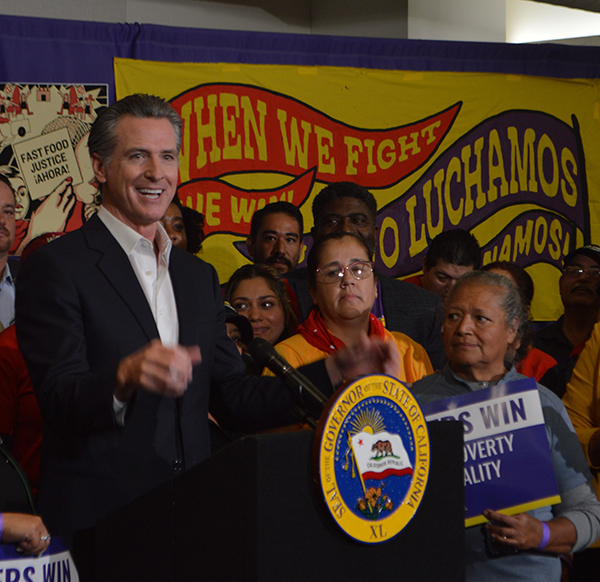Wave Wire Services
LOS ANGELES — Surrounded by chanting and sign-waving workers at their union’s local office, Gov. Gavin Newsom signed into a law Sept. 28 legislation raising the minimum wage for fast-food workers to $20 an hour beginning April 1.
“Eighty percent of the workforce in these fast-food places are people of color,” Newsom said at the Wilshire Boulevard offices of the Service Employees International Union Local 721. “Two-thirds are women. The majority are breadwinners, and we have the opportunity to reward that contribution, reward that sacrifice and stabilize an industry in turn. What a remarkable moment.”
The approval of AB 1228 was the result of a hard-fought agreement struck earlier this year between the union and fast-food companies.
In exchange for the increase in minimum wage, unions agreed to drop a provision that would have made fast-food companies liable for workplace violations committed by independent franchisees in the state. Restaurant operators also agreed to drop a referendum effort that would have put the wages issue on the ballot next year.
The legislation “preserves the franchise business model in the state and solidifies the best possible outcome for workers, local restaurant owners, and brands,” Matt Haller, president and CEO of the International Franchise Association, said in a statement. “Common sense has prevailed, as franchising is responsible for creating opportunities for hundreds of thousands of people to become small business owners, and this agreement eliminates the existential threats our members faced.”
Sean Kennedy, executive vice president of the National Restaurant Association, added that Newsom’s signature “brings to an end a years-long and expensive fight over the regulation of the California quick service industry.”
“We appreciate Governor Newsom’s efforts to bring the sides together and his show of support in signing into law the final agreement,” Kennedy said in a statement.
He added that the legislation will create “significant challenges … that restaurants will have to navigate,” but he said the oversight created by the law will provide stability to the industry. The law also calls for the creation of a “Fast Food Council” to oversee potential future wage increases tied to inflation while also overseeing standards on working conditions.
SEIU President Mary Kay Henry said in a statement the legislation will provide higher income and workplace protections for more than a half-million fast-food workers in the state.
“After a decade of strikes, organizing and militant action in the streets, California fast-food workers are showing the world what it looks like when working people seize their power and rewrite the rules to work for them,” Henry said. “Their efforts reflect a broader trend across the service sector — from long-term care to child care, airports and more — where we are seeing Black, [Asian], Latina and immigrant women fed up with the status quo, standing up and demanding the ability to join together for better wages, benefits and protections.”









